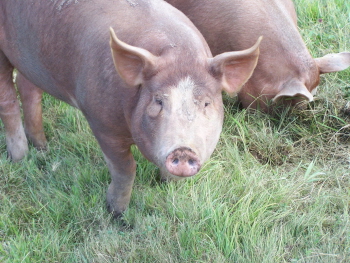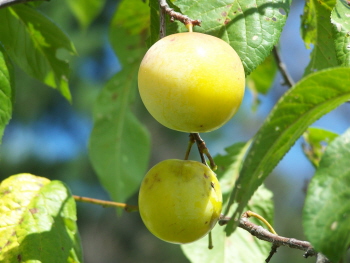Direct Sales
Jeff and Cindy sell eggs and meat from poultry directly to customers through on-farm pick-ups, or through deliveries for some egg customers. They also sell half or whole hogs directly to customers. They get most of their customers through word-of-mouth; many customers are co-workers, for example, or met Jeff and Cindy through involvement in different organizations (see Farm Business > Professional Development). Their emphasis on a direct-sales model is partly due to personal preferences, as described in Marketing > Models, but it also relates to the regulations surrounding meat sales (described on the next two pages).
Educator’s Perspective: Resource Tip According to the MDA’s Official State Inspection Program, Minnesota is one of 28 states that have an "Equal To" inspection program. State-inspected products may only be sold within Minnesota while federally inspected products may be sold across state lines. The State Inspection Program is considered to be "equal to" that of federal inspection and is routinely reviewed to ensure the state is meeting the federal meat inspection requirements. Links to lists of Custom-Exempt, Minnesota Equal-To, and USDA processing plants in Minnesota are on the MISA website’s Meat Processing Plants page. |
Eggs are Cindy and Jeff’s most consistently offered product throughout the year. They sold 608 dozen eggs in 2010; in 2011, they increased their laying flock from 50 to 70 hens, and they still can’t meet the demand they have from co-workers. Cindy and Jeff feel the eggs are a classic case of a product that sells itself, which they credit to their hens’ free-ranging diets and supplemental winter greens. One customer reported back that her teenage son (not the demographic one would expect of a discriminating egg connoisseur!) went to make himself some eggs. He didn’t know they were different than any others he’d encountered in their refrigerator, but after eating them, he ran to his mom demanding to know where they’d come from, as they were the best eggs he’d ever had!
Farmer’s Perspective: Lessons Learned Cindy and Jeff have found that their customers appreciate the transparency of their operation, and some even want to contribute – for example, by volunteering on poultry processing day (see Farm Business > Human Resources). Cindy and Jeff have learned, however, that there is a fine line between what most customers want to know and what they want to see. Based on feedback from 2010, for example, they moved their mobile unit to a different location on processing days. Customers generally liked seeing where the processing was done, but many balked at having to walk right by the mobile unit when they came to the farm to pick up their birds. Cindy and Jeff agree with others; such as Chris Duke of Pastured Perfect Poultry, who speaks on this topic; that, to a degree, farmers like themselves are selling certain ideas of what small diversified farms look like. Cindy and Jeff strive for the right balance. They don't hide anything or “whitewash” their operation to their customers, but they also take reasonable steps to make patrons feel comfortable. |
 |
 |


